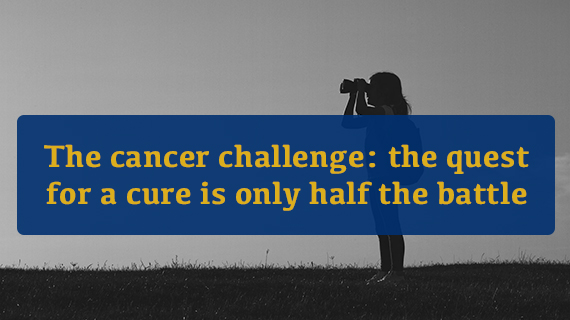The cancer challenge: the quest for a cure is only half the battle

The cancer challenge is affecting more and more people worldwide, with 21 million cases expected by 2030. While the search for a cure goes on, there are many other fronts in the ‘war on cancer’, states pharmaphorum’s Andrew McConaghie in the latest edition of Deep Dive magazine - Deep Dive: Oncology. Here is a taste of his in-depth keynote article from that edition. Read the full article here.
In 1971, the President of the United States Richard Nixon signed the National Cancer Act, signalling the US government’s crusade to find a cure for cancer – what rapidly became known as the War on Cancer.
This bold mission was intended as a follow up to America’s recent success in being the first nation to put a man on the moon.
More than 45 years later, humankind still hasn’t won this war on cancer – and it’s now abundantly clear that curing cancer isn’t rocket science – it’s far more complex than that.
Nevertheless, there has been huge progress in our understanding of the basic mechanisms of cancers – including genomics, the tumour ‘microenvironment’ – and how to hit drug targets with more precisely-aimed therapies.
Progress against cancer challenge
For select groups of cancer patients, there are already drug treatments which can offer a cure – chemotherapy for childhood leukaemias, and Glivec for chronic myeloid leukaemia.
There have also been enormous advances in the treatment of prostate cancer and adjuvant breast cancer in recent years, bringing these much further along the scale towards ‘chronic’ illness and away from the death sentences of old.
There are also exciting cell and gene therapies in the pipeline, including CAR-T drugs, which could offer a cure for some patients with hard-to-treat blood cancers within the next few years.
The checkpoint inhibitor drugs, Merck’s Keytruda and Bristol-Myers Squibb’s Opdivo, lead the field, and are already having a huge impact across a range of tumour types, most notably melanoma and lung cancer.
But it’s easy to get carried away with the excitement around these advances, especially the huge promise of immunotherapy. These are not cures for cancer, and checkpoint inhibitors and combinations with other immunotherapies (such as cancer vaccines) are more likely to be stepping stones towards this goal.
However, even with a cure for many cancers now at least ‘plausible’ there are still many other challenges and dilemmas being thrown up in cancer and cancer treatment.
Another cancer challenge: sugar is the new tobacco
Among all the challenges around cancer, it is perhaps preventing cancer by encouraging more healthy lifestyles which will prove to be the most difficult.
That’s because, in many cases, public health services often have little more than encouragement and persuasion to encourage people to change deep-seated and widespread bad habits such as sedentary lifestyles, smoking, alcohol consumption and poor diet.
However the impact of any success in this area would be enormous – clearly a cancer case prevented is also of huge benefit to society economically.
Earlier diagnosis – a role for pharma
Spotting and treating cancer in its early stages is the most powerful way to improve a patient’s chances of surviving the disease. According to England’s Independent Cancer Taskforce, diagnosing more cases early could save up to 11,000 lives a year in England alone.
A range of new diagnostics which promise to catch cancer early, or spot pre-cancerous risk signs, are likely to play a huge role.
However it’s not just about new diagnostics; healthcare systems also need a complete overhaul of their patient pathways and working practices to affect a real change.
Palliative and end-of-life care
While cancer research so often focuses on extending lives and aiming for cure, for millions of patients every year, the prognosis extends to just months or weeks of life remaining.
In this situation, there is a profound economic, social and medical ethical dilemma: when should healthcare professionals continue therapeutic treatment for as long as possible, and when should the decision be taken to take a palliative approach?
In cancer, this is an increasingly common dilemma, especially as the list of therapeutic options grows year on year in many tumour types.
Read the full article on the cancer challenge in Deep Dive: Oncology now via this link.












